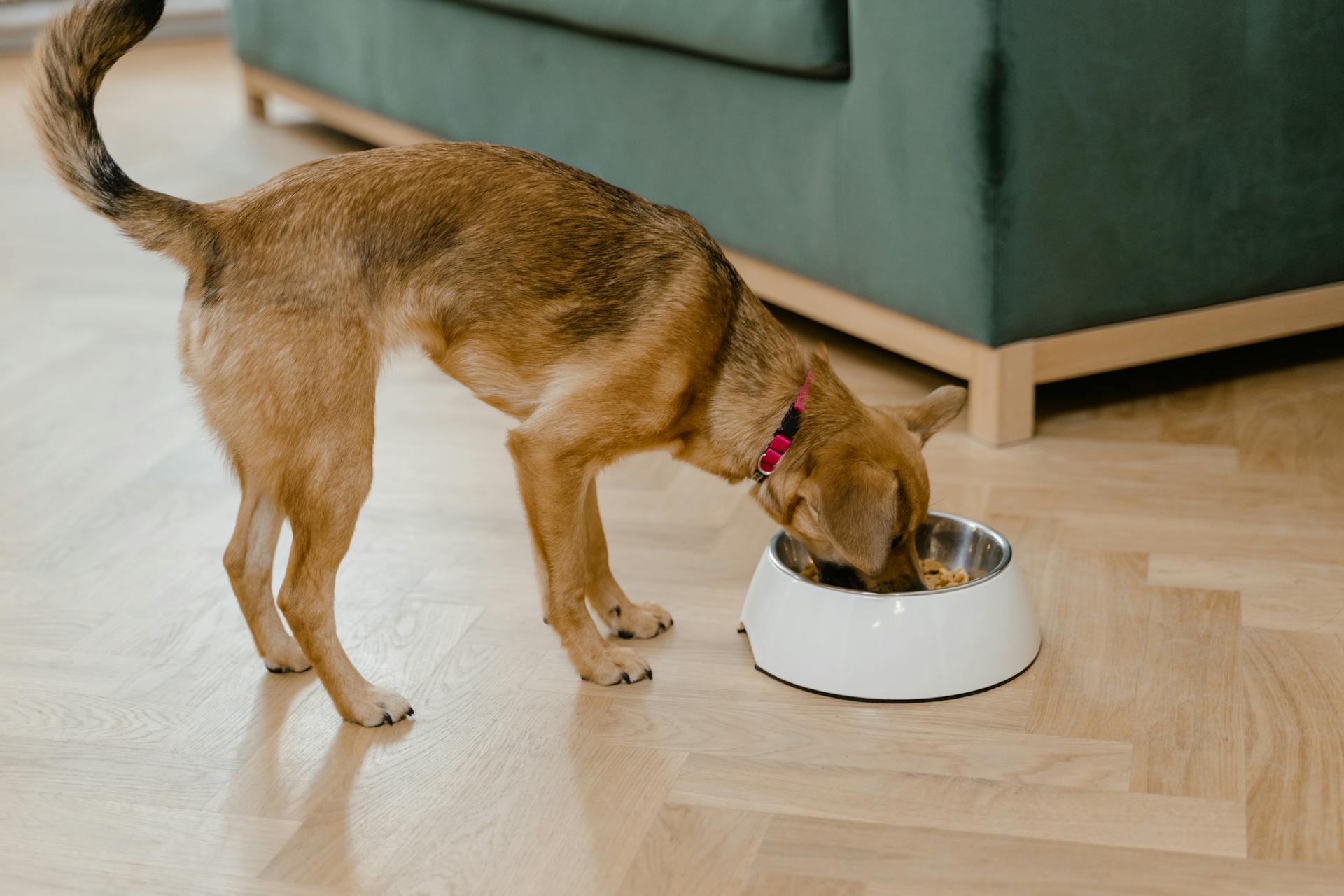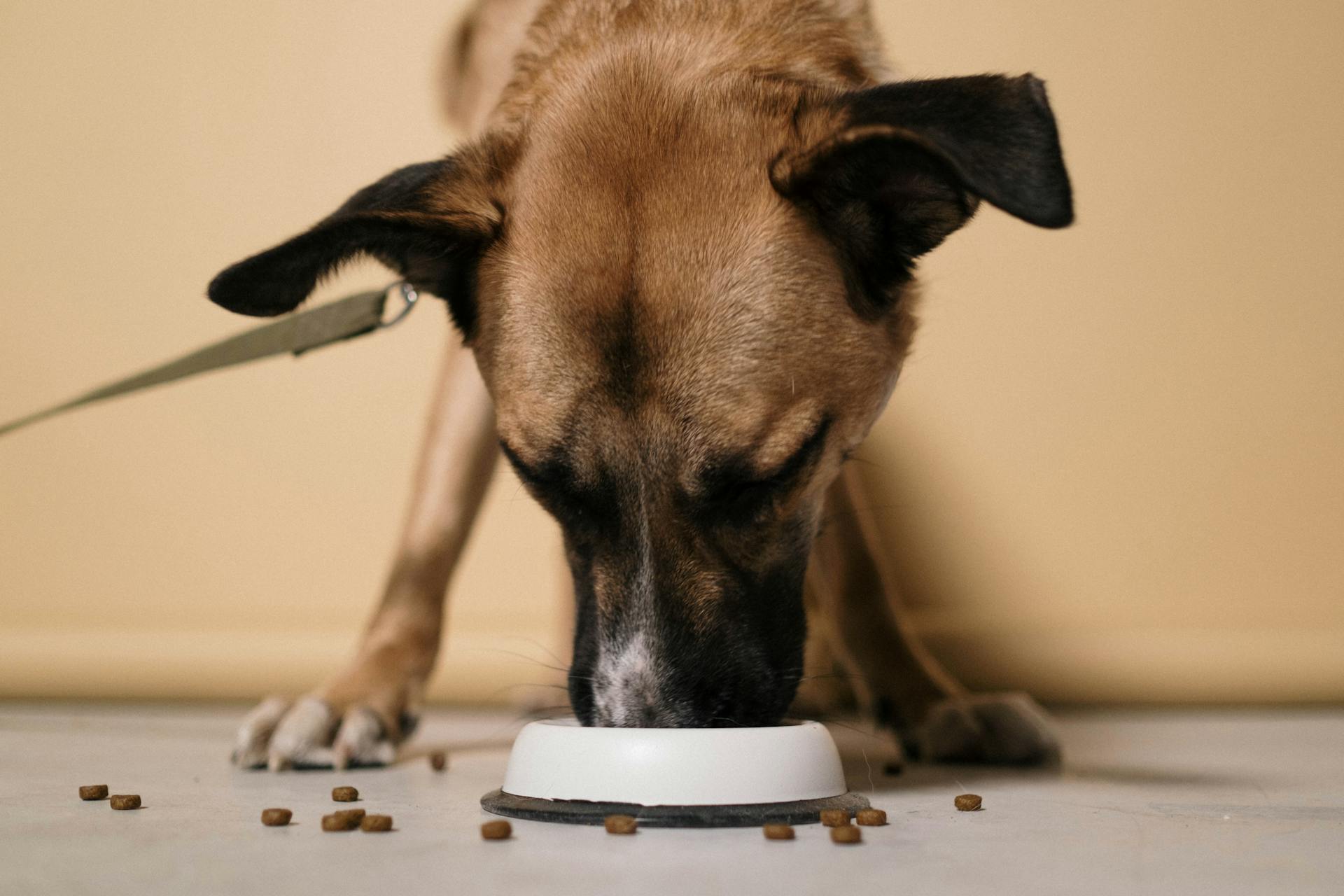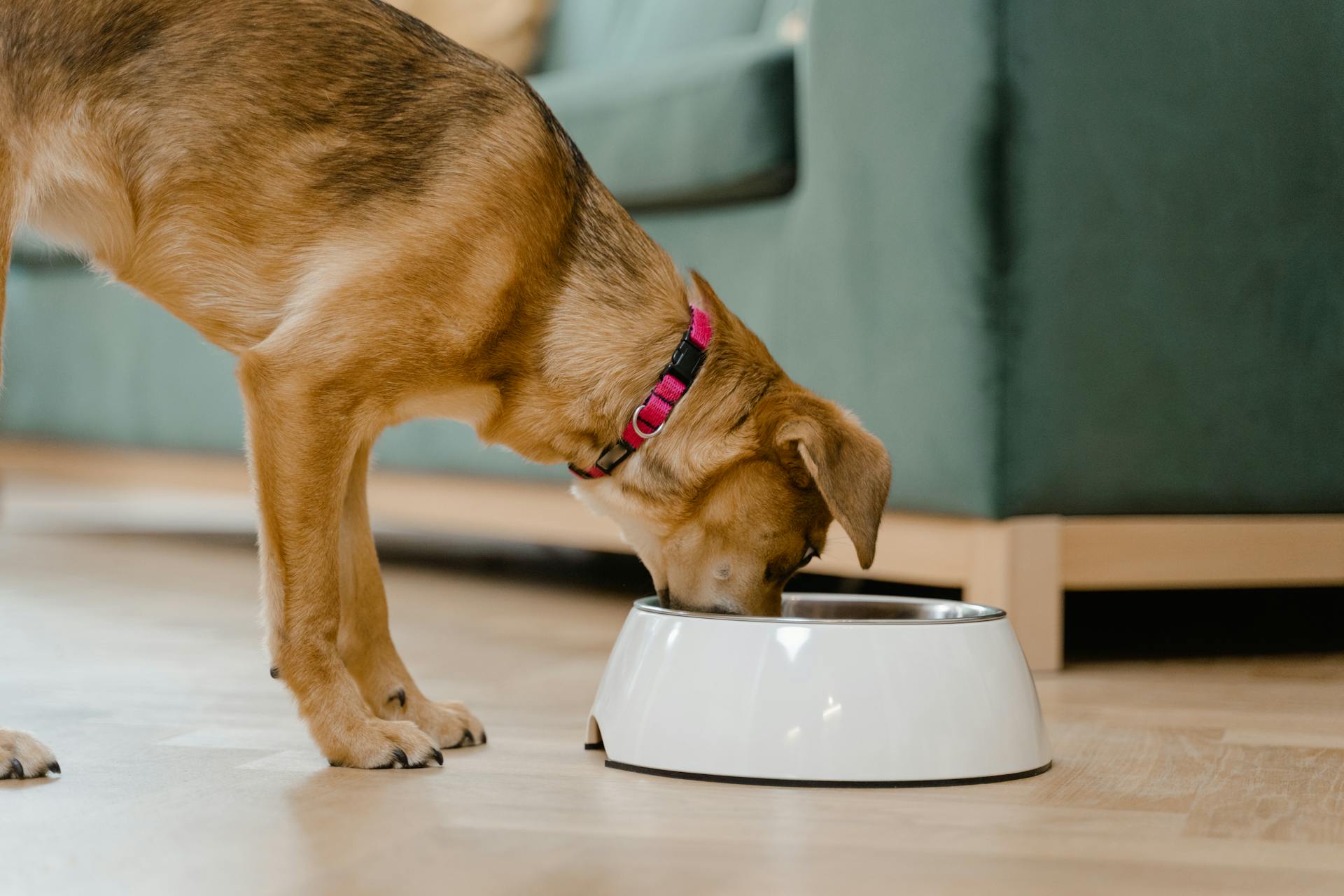
Dogs throw up after eating due to a variety of reasons, including eating too quickly, gobbling food, and swallowing air.
Eating too quickly can lead to a condition called bloat, where the stomach fills with air and puts pressure on the diaphragm, causing vomiting.
Dogs may also vomit if they eat spoiled or rotten food, which can be toxic and cause stomach upset.
To prevent vomiting after eating, try feeding your dog smaller, more frequent meals throughout the day.
Expand your knowledge: Why Is My Dogs Stomach Making Noises and Not Eating
Causes and Symptoms
Dogs throw up for many reasons, and it's essential to identify the cause to ensure your furry friend receives the right treatment. Acute vomiting, which can be defined as sudden or severe bouts of vomiting, is a serious symptom of various diseases, disorders, and complications.
Ingestion of irritating substances, such as garbage or chocolate, can cause vomiting. Toxins or poisons can also trigger this symptom. Pancreatitis, kidney failure, and liver failure are other potential causes. A diet change, intestinal parasites, viral infection, medication reaction, bloat, and bacterial infection can also lead to vomiting.
Some common signs a dog may vomit include lip-licking, drooling, hunched body posture, abdominal contractions, and retching. If your dog is vomiting with diarrhea or vomiting with a poor appetite, it's crucial to call your veterinarian.
Potential causes of dog vomiting include pancreatitis, allergies, dehydration, colitis, poisons, kidney failure, parasites, bloat, and cancer. Abrupt changes in a dog's diet can also cause vomiting. Dog vomiting can occur in any age or breed, but there may be a slightly increased risk in young, unvaccinated puppies that are exposed to contagious disease or in immunocompromised senior dogs.
Here are some possible causes of vomiting in dogs:
- Pancreatitis
- Allergies
- Dehydration
- Colitis
- Poisons
- Kidney failure
- Parasites
- Bloat
- Cancer
- Abrupt changes in a dog's diet
If you suspect your dog has ingested something toxic, it's essential to act quickly. Keep in mind that some substances, like chocolate, can be toxic to dogs even in small amounts.
Diagnosis and Treatment
Diagnosing the cause of a dog's vomiting is crucial to determining the best course of treatment. Your vet will ask you questions about your dog's access to garbage, poisons, and toxins, as well as any recent dietary changes.
A physical examination is also a key part of the diagnostic process. If your vet feels it's necessary, they may run additional tests such as blood work, ultrasounds, X-rays, endoscopic evaluations, biopsies, and urine tests.
Your vet will use various tests to diagnose the underlying cause of your dog's vomiting, including a physical exam, medical history, fecal exam, and blood work. Some common tests include:
Once the cause of the vomiting is determined, your vet will develop a treatment plan to address the underlying issue. This may include medication to control nausea, fluid therapy to prevent dehydration, and a bland diet to help your dog recover.
How Veterinarians Diagnose
To diagnose the cause of your dog's vomiting, veterinarians will typically start by asking you questions about your dog's access to garbage, poisons, and toxins, as well as any recent dietary changes or other symptoms.
They'll also perform a physical examination to get a better sense of your dog's overall health. If necessary, they may run additional tests, such as blood work, ultrasounds, or X-rays, to help determine the cause of the vomiting.
Veterinarians will take a complete medical history, including if your pup has ingested something they shouldn't, to help narrow down the potential causes.
A fecal exam and Parvo test are also common tests used to diagnose dog vomiting.
Blood work and urinalysis can help identify any underlying infections or conditions that may be causing the vomiting.
X-rays and ultrasounds can help veterinarians visualize the inside of your dog's body and identify any potential blockages or abnormalities.
In some cases, an endoscopy may be performed to visually examine the inside of your dog's stomach and intestinal tract.
Here are some common tests used to diagnose dog vomiting:
- A physical exam
- Taking a complete medical history
- A fecal exam
- Parvo test
- Blood work
- Urinalysis
- X-rays
- Ultrasound
- Endoscopy
The specific tests used will depend on the severity of your dog's symptoms and the veterinarian's suspicions about the underlying cause of the vomiting.
Treatment
Treatment is a crucial step in helping your furry friend feel better. Your vet will work with you to create a plan based on the cause of the vomiting and your dog's condition.

The treatment plan may include medications to address the underlying issue, such as anti-nausea medications or medications that coat the stomach lining to protect against gastric ulcers.
Medications like Metoclopramide, Cerenia, and ondansetron or dolasetron may be prescribed to help manage vomiting. Some medications, like sucralfate, famotidine, and omeprazole, can help protect the stomach lining.
Fluid therapy may be necessary if your dog is dehydrated, so it's essential to keep an eye on their water intake. Antacids can also be given to help with acid reflux.
In addition to medications, your vet may recommend a bland diet to help your dog's digestive system recover. This can include foods like chicken, rice, scrambled eggs, and plain yogurt.
Here are some common medications used to treat vomiting in dogs:
- Metoclopramide
- Cerenia
- Ondansetron or dolasetron
- Sucralfate
- Famotidine
- Omeprazole
If your dog is still unable to hold down food, your vet may recommend natural nausea relief aids like acupressure or aromatherapy bands. It's essential to follow your vet's instructions and keep a close eye on your dog's progress.
In some cases, your vet may advise you to withhold food for a short time and then feed a bland, easily digested diet. It's crucial to stick to this diet and not give your dog any other foods during this period. Water should be freely available to prevent dehydration.
Prevention and Management
If your dog vomits after eating, it's essential to know how to manage the situation effectively. The timeline of recovery for dog vomiting depends on the underlying cause, but with proper care, your pup can get back to normal in no time.
To prevent dog vomiting, it's crucial to avoid changing your dog's food or treats abruptly, as this can cause stomach upset.
Feeding spoiled or rancid dog food is a no-brainer to avoid, but it's surprising how many owners still make this mistake. Unhealthy human food can also cause vomiting, diarrhea, and pancreatitis, so it's best to stick to a balanced dog diet.
Dogs can get into all sorts of trouble, so keeping all medications safely stored out of reach and cleaning up all fecal matter in your yard are must-haves for a healthy and happy pup.
Here are some key prevention tips to minimize your dog's risk of vomiting:
- Don’t change your dog’s food or treats abruptly.
- Don’t feed spoiled or rancid dog food.
- Don’t feed unhealthy human food.
- Keep all medications safely stored out of your dog’s reach.
- Clean up all fecal matter in your yard.
Once your dog has been treated for vomiting, it's essential to return them to their normal diet gradually over several days by mixing in small amounts of a bland diet. Adding probiotics to your pup's routine can also help firm up stools and prevent future episodes of vomiting.
Prevention

Prevention is key when it comes to reducing the risk of vomiting in dogs. You can take several steps to minimize the risk by following some simple guidelines.
Don't change your dog's food or treats abruptly, as this can cause stomach upset and lead to vomiting. This is a common mistake many pet owners make, and it's easy to avoid by gradually introducing new foods or treats into your dog's diet.
Feeding spoiled or rancid dog food is a recipe for disaster, so always check the expiration date and smell the food before serving it to your dog. If it smells off or has an unusual texture, it's best to err on the side of caution and discard it.
Giving your dog unhealthy human food can cause a range of problems, including vomiting, diarrhea, and pancreatitis. Stick to a balanced and nutritious dog food that meets your dog's nutritional needs.

To minimize the risk of stress-induced colitis, consider adding probiotic supplements to your dog's diet. These supplements can help maintain a healthy balance of gut bacteria and reduce the risk of digestive problems.
Keeping all medications safely stored out of your dog's reach is crucial, as dogs can be curious and ingest medications if they get the chance. Store medications in a secure location, such as a high cabinet or a locked medicine cabinet.
Regularly cleaning up all fecal matter in your yard is also important, as it can harbor bacteria and other pathogens that can make your dog sick. Make sure to clean up after your dog promptly and dispose of waste properly.
Here are some common household items that can be toxic to dogs:
- Pesticides
- Household cleansers
- Automotive supplies
- Oil diffusers
- Household plants and flower bouquets
By following these simple guidelines and taking a few precautions, you can reduce the risk of vomiting in your dog and keep them happy and healthy.
Recovery and Management

The timeline of recovery for dog vomiting depends on the underlying cause. If your dog has been treated for vomiting, you'll need to return them gradually to their normal diet over several days by mixing in small amounts of a bland diet.
Adding probiotics to your pup's routine is also helpful, as they assist in firming up stools. This can make a big difference in your dog's overall health and comfort during the recovery process.
Contact your vet if you see any of these signs: lethargy, drooling, or vomiting up water. These can be indicators of a more serious issue that needs attention.
If you think your dog ate something toxic, contact the ASPCA's 24-hour Animal Poison Control Center at 888-426-4435. They can walk you through how to give your dog hydrogen peroxide to force them to vomit, but do this with caution and only under the guidance of a professional.
When Is Normal?

Normal vomiting in dogs is not uncommon, and occasional vomiting without other symptoms is usually nothing to worry about. If your dog vomits once without any other symptoms, veterinarians say they're probably fine.
However, if your dog's vomiting can be described as continuous or chronic, it's time to start getting concerned. Vomiting a lot at one time is also a red flag. Other symptoms like fever, weight loss, lethargy, anemia, and vomiting blood are serious signs that require veterinary attention.
Some dogs may vomit with nothing coming up, which can be a sign of a more serious issue. Bloody diarrhea is another symptom that warrants a vet visit. If you suspect your dog has ingested a foreign body or is experiencing seizures, seek help immediately.
If you're ever in doubt about your dog's vomiting, it's always best to err on the side of caution and call your vet for advice.
Frequently Asked Questions
Why is my dog throwing up after eating but acting normal?
Your dog may be throwing up after eating due to chronic gastritis or food indiscretion, which can cause stomach inflammation or eating habits that lead to vomiting. If you're concerned, it's a good idea to consult with a veterinarian to determine the underlying cause.
What does it mean when a dog throws up undigested food?
When a dog throws up undigested food, it may indicate an underlying condition such as an obstruction or bacterial infection. Consult a veterinarian for proper diagnosis and treatment
Can dogs get sick from eating too fast?
Yes, eating too quickly can be hazardous for dogs, increasing the risk of choking, vomiting, and a life-threatening condition called bloat. Slow down mealtime to keep your furry friend safe and healthy.
Can overeating make a dog throw up?
Yes, overeating can cause a dog to vomit, but the vomiting usually stops once the stomach has emptied. If vomiting persists or prevents your dog from keeping food down, seek veterinary attention.
Sources
- https://www.akc.org/expert-advice/health/dog-vomiting-causes-diagnosis-and-treatment/
- https://www.petmd.com/dog/symptoms/vomiting-in-dogs
- https://vcahospitals.com/know-your-pet/vomiting-in-dogs
- https://www.usatoday.com/story/news/2023/10/18/why-is-my-dog-throwing-up/71006937007/
- https://be.chewy.com/dog-vomiting-why-is-my-dog-vomiting/
Featured Images: pexels.com


